#BBC Points West
Text

7 notes
·
View notes
Text
Morgana and Gwen as sheriffs, facing off with matching “Queen” badges: this town ain’t big enough for both of us! 😤
Gwaine (regular at the saloon and occasional outlaw): yeehaw 🍻
#OR alternate ending they get together by the end of the duel and realize there IS enough room in this rootin tootin town for both of them 🥲#camelot is just a big ghost town and you can’t convince me otherwise ‼️#aka my Wild West au that’s been rattling on for centuries at this point 😳#bbc merlin#morgwen#morgana x gwen#gwen x morgana#guinevere pendragon#morgana pendragon#sir gwaine#bbc merlin memes
61 notes
·
View notes
Text
Spike Milligan: 'Follies of the Wise'
As the festive season approached in 1970, families would have pored over the special edition of the Radio Times to see what treats the three television channels could offer. If on New Year’s Eve had they walked across the room to warm up the set, and twiddled the knob to find BBC One, they would have seen a programme called Follies of the Wise presented by Spike Milligan. The writer, actor and…
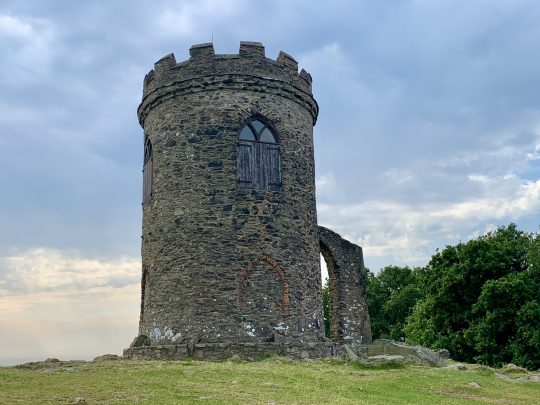
View On WordPress
#BBC#Centre Point#Dunstan Pillar#Jack the Treacle Eater#McCaig&039;s Tower#Old John Bradgate Park#Rushton Triangular Lodge#Spike Milligan#St Peter and St Paul Ormskirk#The Pineapple Dunmore#Wainhouse Tower#West Wycombe
0 notes
Text
“Did they really decapitate babies?” my 14-year-old daughter asked me yesterday. She was pointing to a text message on her phone from a friend. “They’re saying they found Jewish babies killed, some burnt, some decapitated.” And I froze. Not because I didn’t know what to say—though in truth I didn’t know what to say—but because for a moment I forgot what century I was in. All of the assumptions I had made as a Jewish father, even one who had grown up, as I did, with the Holocaust just a few decades past, were suddenly no longer relevant. Had I adequately prepared her for the reality of Jewish death, what every shtetl child for centuries would have known intimately? Later in the day, she asked if, for safety’s sake, she should take off the necklace she loves that her grandparents had given her and that has her name written out in Hebrew script.
The attack by Hamas on Israeli civilians last Saturday broke something in me. I had always resisted victimhood. It felt abhorrent, self-pitying to me in a world that seemed far away from the Inquisition and Babi Yar—especially in the United States, where I live and where polls repeatedly tell me that Jews are more beloved than any other religious group. I wasn’t blind to anti-Semitism and the ways it had recently become deadlier, or to the existential dread that my family in Israel felt every time terrorists blew up a bus or café—it’s a story whose sorrows have punctuated my entire life. But I refused to embrace that ironically comforting mantra, “They will always want to kill us.” I hated what this tacitly expressed, that if they always want to kill us, then we owe them, the world, nothing. I deplore the occupation for both the misery it has inflicted on generations of Palestinians and the way it corrodes Israeli society; when settlers in the West Bank have been attacked, it has pained me, but I have also felt anger that they are even there. In short, I wasn’t locked into the worldview of my survivor grandparents and I felt superior for it.
But something in me did break. As I was driving on Tuesday, I heard a long interview on the BBC with Shir Golan, a 22-year-old woman who had survived the attack at the music festival where more than 250 people were killed, her voice sounding just like one of my young Israeli cousins. She described, barely able to catch her breath, how the shooting had started and how she’d begun to run. She’d found a wooded area and tried to hide. “I got really into the ground,” she said. “I put the bushes on me.” Covered with dirt and leaves, she’d waited. A group of terrorists had shown up and called for anyone hiding to come out. From her spot under the earth, she’d seen three young people, whom she called “children,” emerge. “I didn’t go out because I was scared. But there were three children next to me who got out. And then they shot them. One after one after one. And they fell down, and that I saw. I saw the children fall down. And all that I did was pray. I prayed to my god to save me.”
I pulled my car over because my own hands were shaking as I listened. She then described waiting, hidden in the dirt under bushes for hours, until she saw the terrorists begin to light the forest on fire. “I didn’t know what to do. Because if I’m staying there, I’m just burnt to death. But if I go out they are going to kill me.” She crawled over to where she saw dead bodies and lay on top of them, but the heat soon approached, so she found more bushes to hide in until she could run again. Burnt bodies were everywhere, and Shir looked for her friends but couldn’t find them, couldn’t even see the faces of those killed because they were so badly burned. “I felt like I was in hell.” She finally escaped in a car.
Her story flung me back to my grandparents’ stories. My grandmother hid in a hole for a year in the Polish countryside, also under dirt, also scared. My grandfather spent months in Majdanek, a death camp, and saw bodies pile up in exactly this way. Stories are still emerging of families burnt alive, of children forced to watch their parents killed before their eyes, of bodies desecrated. How was this taking place last Saturday?
But these stories aren’t what broke me. What did was the distance between what was happening in my head and what was happening outside of it. The people on “my side” are supposed to care about human suffering, whether it’s in the detention camps of Xinjiang or in Darfur. They are supposed to recognize the common humanity of people in need, that a child in distress is first a child in distress regardless of country or background. But I quickly saw that many of those on the left who I thought shared these values with me could see what had happened only through established categories of colonized and colonizer, evil Israeli and righteous Palestinian—templates made of concrete. The break was caused by this enormous disconnect. I was in a world of Jewish suffering that they couldn’t see because Jewish suffering simply didn’t fit anywhere for them.
The callousness was expressed in so many ways. There were those tweets that did not hide their disregard for Jewish life—“what did y’all think decolonization meant? vibes? papers? essays? Losers”—or the one that described the rampage as a “glorious thing to wake up to.” There was the statement by more than two dozen Harvard student groups asserting, in those first hours in which we saw children and women and old people massacred, that “the Israeli regime” was “entirely responsible for all unfolding violence.” And then there were the less explicit posts that nevertheless made clear through pseudo-intellectual word salads that Israel got what it deserved: “a near-century’s pulverized overtures toward ethnic realization, of groping for a medium of existential latitude—these things culminate in drastic actions in need of no apologia.” I hate to extrapolate from social media—it is a place that twists every utterance into a performance for others. But I also felt this callousness in the real world, in a Times Square celebratory protest promoted by the New York City chapter of the Democratic Socialists of America, at which one speaker talked of supporting Palestinians using “any means necessary” to retake the land “from the river to the sea,” as a number of placards declared. There were silences as well. Institutions that had rushed to condemn the murder of George Floyd or Russia for attacking Ukraine were apparently confounded. I watched my phone to see whether friends would write to find out if my family was okay—and a few did, with genuine and thoughtful concern, but many did not.
I’m still trying to understand this feeling of abandonment. Is my own naivete to blame? Did I tip too far over into the side of universalism and forget the particularistic concerns to which I should have been attuned—the precarious state of my own tribe? Even as I write this, I don’t really want to believe that that’s true. If I can fault myself clearly for something, though, it’s not recognizing that the same ideological hardening I’d seen on the right in the past few years, the blind allegiances and contorted narratives even when reality was staring people in the face, has also happened, to a greater degree than I’d imagined, on the left, among the people whom I think of as my own. They couldn’t recognize a moral abomination when it was staring them in the face. They were so set in their categories that they couldn’t make a distinction between the Palestinian people and a genocidal cult that claimed to speak in that people’s name. And they couldn’t acknowledge hundreds and hundreds of senseless deaths because the people who were killed were Israelis and therefore the enemy.
As the days go on, the horrific details of what happened—those babies—seem to be registering more fully, if not on the ideological left, then at least among sensible liberals. But somehow I can’t shake the feeling of aloneness. Does it take murdered babies for you to recognize our humanity? I find myself thinking—a thought that feels alien to my own mind but also like the truth. Perhaps this is the Jewish condition, bracketed off for many decades and finally pulling me in.
When news broke of the Kishinev pogrom in 1903 that took 49 lives (compare that with the 1,200 we now know were killed on Saturday), it caused a sensation throughout the world. “Babes were literally torn to pieces by the frenzied and bloodthirsty mob,” The New York Times reported. “The local police made no attempt to check the reign of terror. At sunset the streets were piled with corpses and wounded. Those who could make their escape fled in terror, and the city is now practically deserted of Jews.” In response to that massacre, the emigration of hundreds of thousands of Eastern European Jews to the United States began in earnest; the call of Zionism as a solution also sounded clearly and widely for the first time.
In his famous poem about the massacre, “In the City of Slaughter,” the Hebrew writer Haim Naḥman Bialik lamented, even more than the death, the sense of helplessness (“The open mouths of such wounds, that no mending / Shall ever mend, nor healing ever heal”), the men who watched in terror from their hiding places while women were raped and blood was spilled. I can’t say I know what will happen now that this helplessness has returned—if I’m honest, I also fear that Israel’s retaliation will go too far, that acting out of a place of victimhood, as right as it may feel, will cause the country to lose its mind. Innocent lives in Gaza have been and will be destroyed as a result, and competing victimhood is obviously not the way out of the conflict; it’s the reason that it is hopelessly stuck. But in this moment, before the destruction of Gaza grabs my attention and concern alongside fear for my relatives who have been called up to the army, I don’t want to forget how alone I felt as a Jew these past few days. I have a persistent, uncomfortable need now to have my people’s suffering be felt and seen. Otherwise, history is just an endless repetition. And that’s an additional tragedy that seems too much to bear.
1K notes
·
View notes
Text
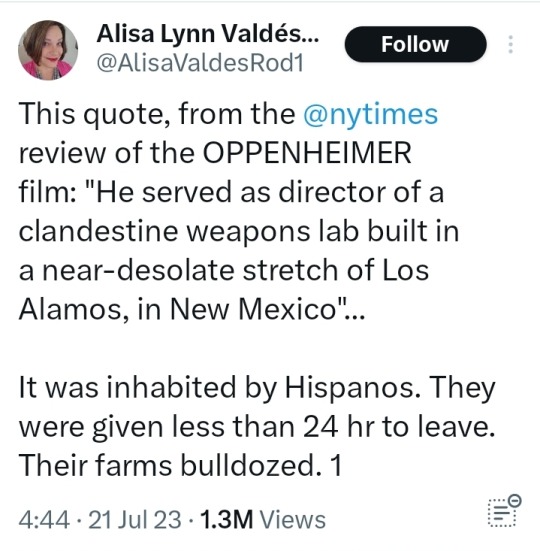
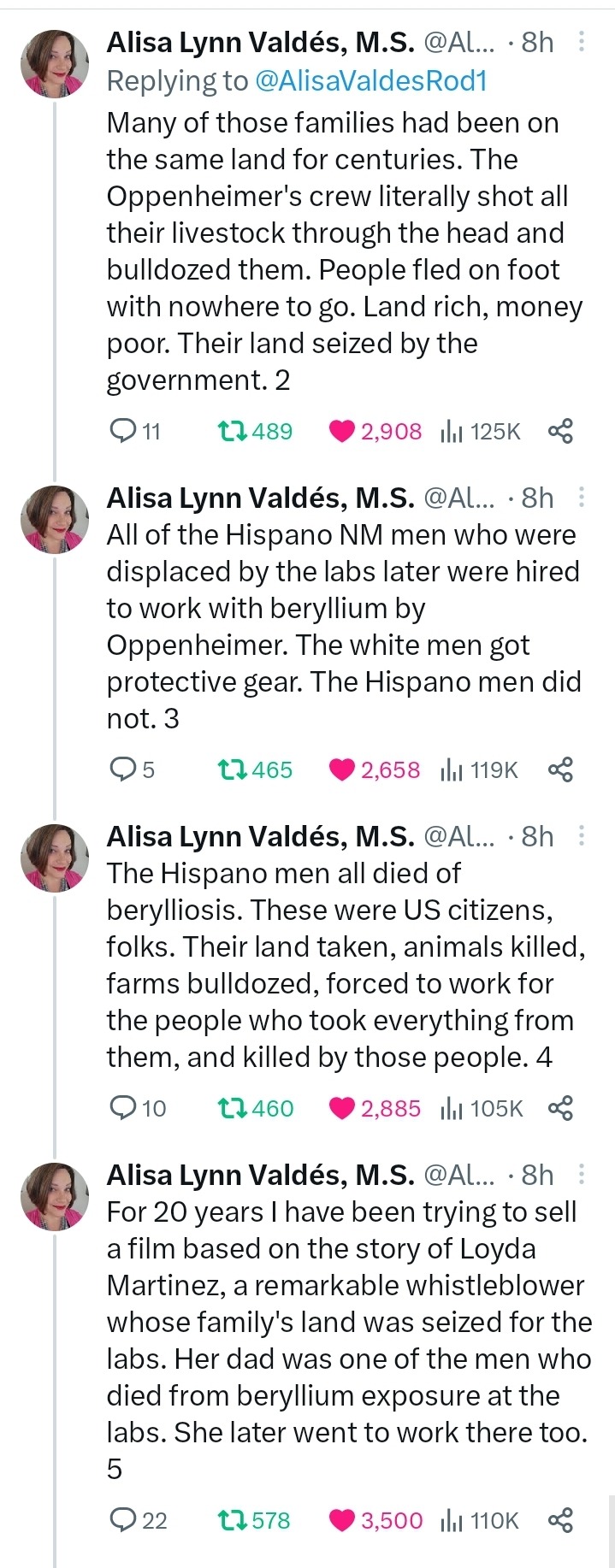

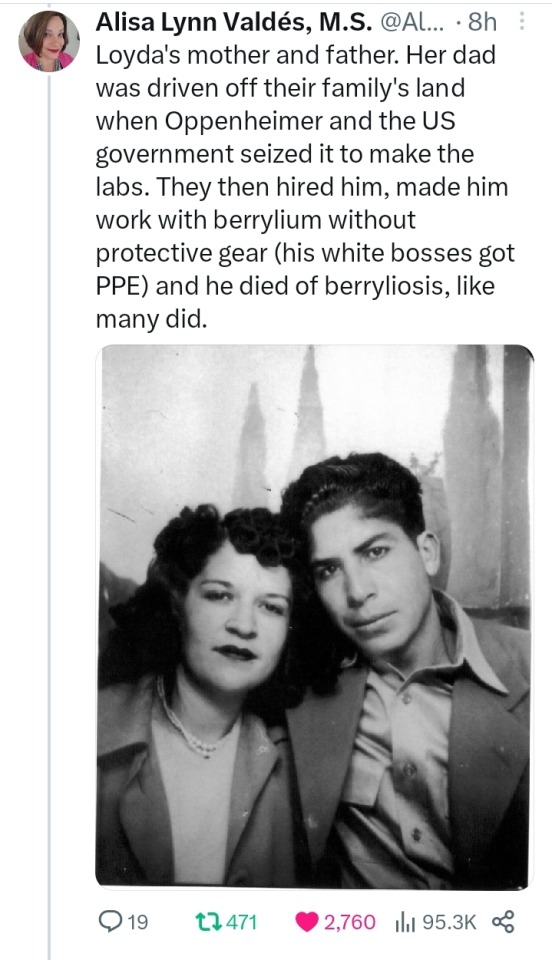
youtube
(alt included in all images)
Another thread by Senator Ben Ray Luján here.
A book on the subject (haven't read it myself):
One of the sources in another one of Alisa's furiously impassioned twitter threads have been debunked, so I didn't include that. But she claims that her own family was caught in the fallout zone when her mother was a baby, which eventually led to her and large numbers of her community developing cancer. It's human for that kind of grief to be caught up in inaccuracies. People are already being ghastly and racist to Hispanos and Indigenous people criticizing the hype for the movie. They're not attacking Oppenheimer for being Jewish, they're criticising the erasure of the human cost of these bombs and the continued valorisation of the U.S military's actions in World War II as some kind of moral saviourism.
While Oppenheimer himself believed that the nuclear bombings of Hiroshima and Nagasaki were morally justified (they had planned to drop them on Germany except they surrendered before they could), he also felt had blood on his hands and regretted his role as the "Father of the Atomic Bomb". He spent the rest of his career vehemently opposing further development of thermonuclear weapons and the hydrogen bomb accurately predicting the concept of mutually assured destruction. This eventually made him a victim of Senator McCarthy's Red Scare and his clearance was revoked. I haven't seen the movie (Christopher Nolan is the kind of casual white racist I avoid on principle) but people who have seen it say that it doesn't glorify nuclear weapons and depicts the man himself with the complex moral nuance that seems to be accurately reflective of his real life.
The backlash to Indigenous and Hispanos people's criticisms and to people pointing out that Hiroshima and Nagasaki were genocides is also frustrating because...both world wars were a clash of genocidal empires. The reason they were world wars is because the countries colonized by Japan, China, the European powers and the US were all dragged into it, whether they wanted to or not. Jews were one of the many colonized peoples that suffered in that time, who were left to die by everyone until they could be used to frame the Allied powers as moral saviours, establishing a revisionist nostalgia for heroism that powers the US military industrial complex to this day.
As early as May 1942, and again in June, the BBC reported the mass murder of Polish Jews by the Nazis. Although both US President, Franklin Roosevelt, and British Prime Minister, Winston Churchill, warned the Germans that they would be held to account after the war, privately they agreed to prioritise and to turn their attention and efforts to winning the war. Therefore, all pleas to the Allies to destroy the death camp at Auschwitz-Birkenau were ignored. The Allies argued that not only would such an operation shift the focus away from winning the war, but it could provoke even worse treatment of the Jews. In June 1944 the Americans had aerial photographs of the Auschwitz complex. The Allies bombed a nearby factory in August, but the gas chambers, crematoria and train tracks used to transport Jewish civilians to their deaths were not targeted.
(Source)
Uncritical consumption of World War II media is the reinforcement of imperialist propaganda, more so when one group of colonized people is used to silence other colonized peoples. Pitting white Jewry against BIPOC is to do the work of white supremacy for imperialist colonizers, and victimizes Jews of colour twice over.
Edit: friends, there's been some doubt cast on the veracity of Alisa's claims. The human cost to the Hispanos population caught downwind of the nuclear tests is very real, as was land seizure without adequate compensation. However, there's no record I can yet find about Los Alamos killing livestock and Hispanos being forced to work for Los Alamos without PPE. There is a separate issue about human testing in the development of said PPE that's not covered here. I'm turning off reblogs until I can find out more. Meanwhile, here's another more legitimate article you can boost instead:
#Youtube#colonialism#colonization#genocide#oppenheimer#nuclear war#nuclear testing#indigenous rights#racism#new mexico#american imperialism#world war ii#hispanos#tw: animal cruelty#loyda martinez#white supremacy#military industrial complex#generational trauma#worker exploitation#colonial trauma#hiroshima#nagasaki#war propaganda#knee of huss#twitter
881 notes
·
View notes
Text
These days, I have long debated what to write regarding Palestine-Israel, and questioned why I should write anything at all. The idea that celebrities and the loudest chronically online people you've ever met, blessed in their ignorance and indifferent to livehoods different than theirs, feel the need to opinate on social and geopolitical issues is absolutely insane. Most of the time, they do more harm than good—spreading misinformation like wildfire. Such opinions are what convinced me to ultimately talk about it.
Rest assured I'm not particularly qualified to talk about any of this, then again no one seems (or tries) to be. This is not a statement, simply questions about selected nuance. Full disclosure: I am of Palestinian descent. And I tried my hardest to be all-encompassing and empathetic; if I fail at any moment, my sincerest apologies.
All around social media I've seen only two kinds of posts regarding Palestine and Israel; they're either completely favorable to Israel and dehumanize Palestine or they treat Palestines as a footnote, in which it's made to assure its author doesn't endorse murder but also to point out that Palestine "deserve what's coming." There's a certain nuance required to support Palestine that's not asked when supporting Israel.
I've seen Jamie Lee Curtis reposting a picture of Palestinian children watching Israelis air strikes as if they were of Israeli children. There's no doubt it was a malicious-intended post considering she credited the photographer while deleting the original caption which explicitly explained who the ones pictured were. After being severely corrected in the comments, she simply deleted and made no mention of it. Guess children don't matter if they're Palestinian. I've seen way too many celebrities responding to the conflict with worries about how they might be affected by it, as self-centered and selfish as you can imagine.
I've seen a journalist claim that 40 Israeli babies were beheaded and multiple newspapers (many of them British, because what else can you expect from them?) and public figures reposting as a fact, only for the same journalist to later claim she actually "never said that" (she absolutely did). Also the IDF explaining they have no information confirming the allegations that 'Hamas beheaded babies'. I've seen people using statements from Sabra and Shatila massacre survivors and trying to rewrite Palestine, which were the victims of said crime, as the perpetrators. I've seen people using videos of Russian attacks as Palestinian ones. I've seen a British journalist fabricating a harmful statement from a Palestinian Ambassador to help dehumanize Palestine, and being proud of such. I've seen BBC using the nuances of language to their liking, reporting how Israelis were 'killed' while Palestinians 'died'. Always heard journalists avoid adjectives in favor of being unbiased. Again, guess that's unimportant when it comes to Palestine. Most of all, I've seen people equate supporting Palestine to anti-semitism.
If that belief steams that Palestine and Hamas are one-and-the-same, and the latter is a anti-semitism organization, then that's another concern I'd like to add the recently appraised 'nuance'.
Hamas first appeared during the first intifada, a Palestinian uprising against Israeli occupation of the West Bank, Gaza, and East Jerusalem. The signing of the Oslo Accords in 1993 marked the end of the uprising—an agreement between Israel and Palestine meant to lay the groundwork for the formation of a Palestinian state alongside Israel. Instead, it has erased Palestine's recognition as a State. In its history, Hamas have equate the liberation of Palestinians with the destruction of Israel, likely the reason they're a highly divisive organization that has often been at oddens with more mainstream Palestinian politicians. However, Hamas backtracked on its aims in a 2017 proclamation, making it clear that what it wants is to end a “racist, anti-human and colonial Zionist project.” In its 16th topic, they state "Hamas affirms that its conflict is with the Zionist project not with the Jews because of their religion. Hamas does not wage a struggle against the Jews because they are Jewish but wages a struggle against the Zionists who occupy Palestine."
The description of the Israeli occupation as fascist most likely comes from the similarities of Palestine to an "open air prison". They have no control of their own borders (IDF controls who and what enters or leaves) and are deemed stateless. "In defiance of international law, Israel considers all Palestinians inhabitants of the occupied Palestinian territory as non-citizens and foreign residents." Meaning if they leave their territory, they won't be allowed back in. Their rights in the Arab World are uncertain, particularly in Lebanon and Egypt where they are denied rights to secure residency, employment, property, communal interaction and family unification. Procedures to allow non-residents to apply for naturalisation in Lebanon, Egypt and Saudi Arabia do not apply to stateless Palestinians. So while those asking for Palestinians to be evacuated for their safety certainly have noble intentions, I ask of you: where they will go? Can you imagine walking away from home knowing you're heading into nothing? What's the difference between living in the rumbles of their homes and being homeless in another country?
The ones who decide to stay (and the ones unable to leave) are likely not making it for much longer. According to the United Nations, roughly 6,400 Palestinians and 300 Israelis have been killed in the ongoing conflict since 2008, not counting the recent fatalities. Is it truly a war if one side is so overpowering in its resources and retaliations? I feel the need to point out these stats to question why the notion that "violence is never the answer" is only used now. When it has been the only response until now.
Then again, Hamas remains a polarizing force in Palestinian society. They're an organization that's slaughtering families and less than a third of Palestinians think the group deserves to represent them. There has not been an opportunity, however, for elections to change their representatives. Palestinians living in Gaza must endure an unstable political reality with an unrepresentative government implementing repressive policies against LGBTQ people and abusive policies against detainees. Israel's Prime Minister Netanyahu purposefully propped up Hamas and there has been speculation that Iran has supported them. I've seen many post as if it's a fact, so I'd like to reinforce that it's speculation. In essence, Hamas is a terrorist group with questionable history and even more questionable allies. None of which has the Palestine's best interests at heart.
This has been overly long, and I still haven't touched on all topics I wished to address. Some I probably couldn't express properly since it's such a complex geopolitical issue. Then again, no one seems to try while all seem very comfortable in being as biased as they wish to be. So I thought I add my compassionate two cents in favor of Palestine and all the years of oppresion they've endured. I still hope you'll read this to the end, and extended to Palestine the same sympathetic hand you've rightfully extended to Israeli citizens.
My heart aches for the innocent people murdered, Palestinian and Israeli. Settlers aren’t innocent, but people who were born there didn't really choose to be one. Jewish people following matters of faith don't deserve to die. No one has (or should have) the right to take someone's life away. People at the Gaza Strip that are either just trying to survive or attempting to protect their homes also don't deserve to die, as flawed as their logic and actions might be, and many are missing that nuance. The denial of food, water, and medical aid, violates the Geneva convention. And it's a kind of retaliation that Palestine in its entirety will never be able to match.
Currently, the Israeli government is preparing a ground invasion of Gaza. An anonymous Israeli official said they would turn Gaza into “a city of tents.” A parliamentarian said that Israel should not concern itself with the safety of any Gazans who “chose” to stay in the Gaza Strip, as if every crossing hasn't been blocked.
Soon, the 'war' will end. And when it does, I can assure you Palestine won't be the last one standing. They've never had a real chance. I'd like to remember everyone that, despite Netanyahu's claims that they are "human animals", Palestinians are human beings. People. All of which deserve to live, deserve compassion and deserve protection. They also deserve to be remembered.
465 notes
·
View notes
Note
Can you explain the Iran-Israel situation please?
Alright, let's get to it. Please note that I'm writing this on mobile during my lunch break, so I can't include reference/source links as much as I'd like. Thankfully, most of what I'm going to be telling you should be easily located by searching for an article on one of the following: APNews, Reuters, BBC Global News Podcast, Democracy Now!, NPR, or The New York Times. Long-term background is probably best found in videos by the YouTube channels Real Life Lore or tldr global news, or on Wikipedia if you prefer text.
The short version: Israel attacked Iran's consulate in Syria to get at some of the military commanders that were there, which is legally equivalent to attacking Iran itself. Iran responded by sending about 300 bombs at Israel, most of which were shot down in transit. Given that they still called it a success, even though it seems only one person was even hurt, my understanding is that it's very likely that they only intended the rockets to be a show of force, rather than an actual escalation, because Iran can't afford a war right now.
To support my blogging so I can move out of my parents’ house, I do have a ko-fi. Alternately, you can donate to one of the charities I list in this post OR this post.
The long version:
Okay, let's start with some background on Israel, then Iran. This is... a lot, so if you already know the broad strokes skip down to 2023.
Israel was established following WWII by the English and French, following borders the two countries had secretly drawn up decades earlier in the Sykes-Picot agreement. The intent was to give the Jewish people a place to go... or, depending on who you ask, a place to send them. Their ancestral homeland was viewed as the best choice, sort of like a deportation millennia after a diaspora. Given that WWII had just ended by the time Sykes-Picot was actually put into effect, 'getting out of Europe' was something a lot of Jews were given to agree with.
The Arab world was not happy, as that land had belonged to the Ottomans for centuries, and had long since 'naturalized' to being Arab. I'm not going to pretend to know the nuances to when people do or do not consider Palestine to have been its own nation; it was an Ottoman state until WWI, at which point it came under British control for just under three decades, and that period is known as the British Mandate of Palestine; it ended after WWII, with the creation of Israel. Palestine's land and people have sort of just been punted around from one colonizer to another for centuries.
Iran is the current form of what was once Persia. They were an empire for a very long time, and were a unitary monarchy up until the early 20th century; in 1925, Iran elected a Prime Minister who was then declared the monarch. The following several decades had Iran's monarchy slowly weakened, and occasionally beset by foreign interventions, including a covert coup by the US and UK in 1953. The country also became more corrupt throughout the 1970s due to economic policy failing to control inflation in the face of rising oil prices.
In 1979, there was a revolution that overthrew the monarchy and the elected government, replacing the system with a theocracy and declaring Iran to be an Islamic Republic, with the head of state being a religious authority, rather than an elected one. This was not popular with... most countries. 1980 saw the closure of all universities (reopened in 1983 with government-approved curriculums), as well as the taking of over fifty American hostages from the US Embassy in Iran. You may have heard about that in the context of Ronald Reagan encouraging Iran to keep the hostages until the end of Carter's term in order to force the election.
So, the West didn't like having an Islamic state because it claims to like democracy, and also because the Islamic state was explicitly anti-American and this has some Bad Effects on oil prices. The Soviets didn't like having an Islamic State because a theocracy goes directly against a lot of communist values (or at least the values they claim to have), and weakened any influence their supposedly secular union could have on Iran and the wider middle east. The other countries in the Arab world, many of them still monarchies, didn't like the Islamic republic because if the revolution spread, then it was possible their monarchies would be overthrown as well.
(Except Oman, which is not worried, but that's the exception, not the rule.)
This is not a baseless worry, because Iran has stated that this is its goal for the Arab world. Overthrow the monarchies, overthrow the elected governments, Islamic Rule for everyone. That is the purpose of its proxies, like Hezbollah (Lebanon), the Houthis (Yemen), and Hamas (Palestine), along with less well-known groups like the Salafi Jihadists in Mali, who are formally under the umbrella of al-Quaeda, which Iran denies having any relation to but is suspected of funding. In areas where these proxy groups have gained power, they are liable to enact hard Shari'a law such as has happened in Northern Mali and other parts of the Sahel region.
While other conflicts have occurred in these countries, I think the above is most relevant.
Israel has repeatedly attacked, or been attacked by, other nations in the middle east, as they are viewed as having taken over land that is not theirs, and as being a puppet of the US government. The biggest conflicts have been 1947-1948, 1968/1973, and 2014.
And then, of course, 2023.
Now, Iran, more than any other nation in the Middle East, hates Israel. They have for a very long time, viewing them as an affront to the goal of spreading Islam across the whole of the middle east, and as being a front and a staging ground for the United States and other Western powers. Two common refrains in the slogans of Iran and its proxies are "Death to America" and "Death to Israel."
Due to Iran's military power and virulence towards Israel, the United States has been funneling money to Israel for decades. It has more generally been to defend itself against the Arab world at large, but it has narrowed over the decades to being about Iran and its proxies as relations have normalized with other nations like Egypt and Saudi Arabia.
Cue October 7th, 2023. Hamas invades Israeli towns, kills some people, and takes others as hostage. Israel retaliates, and the conflict ramps up into what is by now tens of thousands of dead, some half of which are children.
In this time, Hamas's allies are, by definition, Iran and the other proxy forces. Hezbollah, being in Lebanon, share a border with Israel's north. They have been trading rocket fire across the border in waves for most of the past six months. The Houthis, down in Yemen, claim to be attacking the passing cargo ships in order to support Palestine. Given that the attacks often seem indiscriminate, and that the Houthi's control over their portion of Yemen is waning in the face of their poor governance, this is... debatable. It's their official reason, but given that "let's attack passing ships, claiming that we only attack Israeli or American ships and that it is to support Palestine" is rallying support domestically for their regime, it does seem to be more of a political move to garner support at home than about supporting Palestine.
Iran, however, has not attacked Israel. They've spoken out about it, yes, but they haven't done anything because nobody wants a regional war. Nobody can afford it right now. Iran is dealing with a domestic crisis due to oil subsidies bleeding the states' coffers dry, and the aging Ayatollah Ali Khamenei, the leader of Iran, refusing to pick a successor. They are looking at both an economic crisis and succession crisis, and a regional war would fuck up both situations further. Iran funds most of its proxies, and they can't do that, and fight a war on top of it, while their economy is in its current state. Pure self preservation says they don't want a war, especially with the ongoing unrest that's been going on for... well, basically since the revolution, but especially since the death of Mahsa Amini.
Meanwhile, in Israel, Netanyahu has been looking at corruption charges and legal issues since before the Hamas attack. It's generally agreed that if Israel were to hold new elections right now, he would lose and be replaced, and also immediately taken to court. Netanyahu wants to stay in power, and as long as the war on Hamas lasts, he is unlikely to get voted out. A change in leadership in the middle of a war is rarely a good idea for any country, and he's banking on that.
However, the war on Hamas rests on the shoulders of American money and supplies. Without that military support, Israel cannot fight this war, and America... is losing patience.
Officially, America and most of the western world have been telling Israel to not fucking escalate for the majority of the war.
There have been implied threats, more or less since Schumer's big speech about how Israel needs a new election, of American legislators putting conditions on any future aid. There have even been rumblings of aid being retracted entirely if Israel follows through on invading Raffah.
So...
American aid to Israel has, for a very long time, been given in the name of defending Israel against Iran and its proxies.
Israel has been fighting this war against Hamas for six months, killing what is by now innumerable civilians, on the power of US military aid.
Netanyahu benefits from the continued war due to domestic troubles.
Iran does not want a regional war, or really any big war, due to its own domestic troubles.
The US is, in theory, losing patience with Israel and threatening to pull the plug on unconditional support. It's very "we gave you this to fight Iran. Stop attacking civilians. If you keep attacking civilians, then you're going to have to rely on what we already gave you to fight off Iran so that you won't keep wasting it on civilians."
Israel... attacks Iran, prompting a response, and is now talking about escalating with Iran.
I am not explicitly saying that it looks to me like Israel, which is already fighting a war on two physical fronts and even more political/economic ones, has picked a fight with Iran so that America feels less like it is able to withdraw support.
I just... am finding it hard to understand why Israel, which is in fact fighting both Hamas and Hezbollah, would attack the Iranian consulate in Syria otherwise. They can't actually afford to fight this war, escalating to a full regional conflict, on a third front.
Not without pressuring American into keeping the faucet of military funding open at full blast.
To support my blogging so I can move out of my parents’ house, I do have a ko-fi. Alternately, you can donate to one of the charities I list in this post OR this post.
#phoenix politics#current events#iran#israel#hamas#houthis#hezbollah#syria#politics#united states#military funding#military aid
96 notes
·
View notes
Note
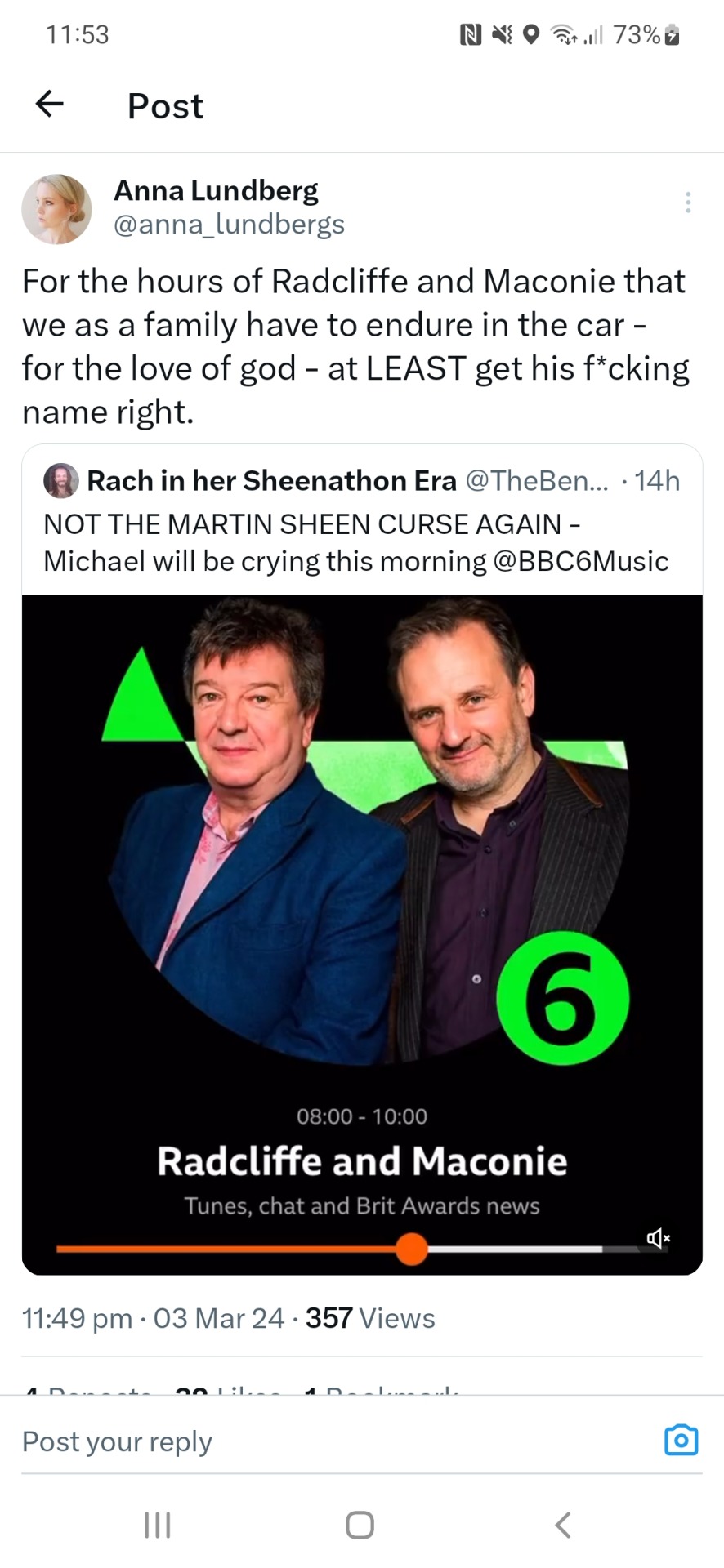
So came I came across this repost from Al that a fan posted yesterday to which she reposted and to have her say and ad I much I can see she trying to defend ms with the radio getting his name wrong it a common thing for poor ms and I don't think this personally was the guys fault and I think they was reading from a script which I think most radio presenters have I think.
But the thing I noticed also was yes she was trying to defend her parter but also seems complaining that she and the children have to endure listening to the station in the car all the time and that like a another red flag like they literally have nothing in common and I'm still wondering why they still together. Cos I've noticed since michael been London he seems alot happier and heathly cos he closer to his best friend and beaming also. Can we have him stay permanently in London and not go bk to Wales in May.
What ur thoughts on this repost for Al I would to hear

(Grouping these together for ease of answering.)
I had this sent to me a little while ago and I'm...well, it takes a lot to floor me these days, especially in this fandom, but...I think this did it. Because there is so much going on here, and almost none of it is good.
On the surface, I know this very much looks like AL defending Michael, but I do not think that's what this was about at all. I think she saw BBC Radio 6 tagged in the original tweet and saw an opportunity to gain attention due to the proximity of a high-profile account. The way she did it, however, was by making something related to Michael about her. Again. And again, the wording of this retweet takes it from AL defending him to something else entirely.
Saying that she has to "endure" Michael listening to this radio show in the car is just a terrible look, as if listening to something he enjoys is so unbearably awful, and that she only puts up with because she's stuck in a car with him. It feels like she's literally complaining about Michael under the pretense of defending him, and I don't know how she (or anyone else) thinks this is okay.
The thing is, the whole "Martin Sheen" thing has become a running joke precisely because Michael has been dealing with this not just for his whole career, but his entire life. It's something he has frequently talked about, and I can imagine that it has been challenging on so many levels, but Michael also knows that Martin Sheen has been in the business for 60 years, and more than that, he is also a fan of Martin's. He's even talked about being introduced to him at a party years ago (I can't remember by whom, but Michael described the person as saying "Mr. President, meet Mr. Prime Minister"--referring to Martin and Michael's roles in The West Wing and The Queen, respectively).
So yes, the overarching point is that Michael doesn't blame Martin Sheen for these repeated mix-ups, and actually respects him as an actor and person. And when he has felt annoyed about this happening (as he did in 2020 when an ITV announcer called him the wrong name prior to a new episode of Quiz), Michael has had no problem calling it out himself on his own social media. Which speaks to your point @thetardisisblueandroseistoo about her trying to speak on Michael's behalf, and again doing a miserable job of it.
Also, what Michael hasn't done--and I suspect would be horrified at Anna doing--is go after the hosts of a show that he just appeared on yesterday. Particularly a show with hosts he is a tremendous fan of, as he spent a good portion of his appearance gushing about them and how much he enjoys listening to the show. I think he would more than understand the one host making this mistake--given his age and how much more embedded Martin Sheen is in pop culture--and would certainly exercise a lot more graciousness than to write a nasty tweet like the one AL did above.
That's the best way I can describe it: Shades of what we saw in the Insta story from last week, with that same self-aggrandizing, passive-aggressive (and now also kind of bitter) tone. There are a hundred other ways she could have responded to this, yet what she chose was to get in a dig at Michael, plus QT a fan tweet so that it could be misconstrued as her yelling at the fan. And again, in the cases where Michael has called out announcers or others for getting his name wrong, it's because he felt he deserved to have his name said correctly. In this case, however, it seems that AL wants the presenter to get Michael's name right because not doing so is an inconvenience to her.
Those were my impressions of AL's tweet, at any rate. All I can say is that from my perspective, if this was her attempting to defend Michael, it could not have been more backhanded. Glad to hear from my followers as well about your thoughts on this. Thanks for writing in! x
#angel19924#thetardisisblueandroseistoo#reply post#michael sheen#welsh seduction machine#at this point i honestly do not understand why she is even still with him#when it seems like she can't stand anything about him#also every time she posts something now it just seems to get more awful#i don't even know anymore#there was just no reason for any of this#and yet#anna lundberg#discourse
83 notes
·
View notes
Text
Non-paywall version here.
"When Arley Gill, head of Grenada’s National Reparations Committee, envisioned his work seeking repair for centuries of enslavement on the Caribbean island, one thing was certain: It was going to be a long slog.
But just two years since its founding, the task force is fielding calls from individuals around the world looking to make amends for ancestors who benefited from enslavement in Grenada.
“If you had told us this would be happening, we wouldn’t have believed you,” Mr. Gill says, crediting a burgeoning movement of descendants of enslavers getting wise to their family’s history and taking action.
In Grenada’s case, the momentum began with a public apology made by former BBC journalist Laura Trevelyan and her family in February at a ceremony on the island. They apologized for their forebears’ enslavement of people in Grenada and their enrichment from it, pledging an initial contribution of £100,000 ($130,000) toward education on the island.
“She opened the doors for people to feel comfortable” coming forward, says Mr. Gill.
In April [2023], Ms. Trevelyan and journalist Alex Renton co-founded an organization called Heirs of Slavery. Its eight British members have ancestors who benefited financially from slavery in various ways...
Heirs of Slavery says wealth and privilege trickle down through generations, and that there are possibly millions of Britons whose lives were touched by money generated from enslavement.
The group aims to amplify the voices of those already calling for reparations, like Caribbean governments. And it supports organizations working to tackle the modern-day consequences of slavery, both in the United Kingdom and abroad, from racism to health care inequities. But it’s also setting an example for others, drafting a road map of reparative justice for enslavement – at the individual level...
“Shining a light is always a good idea,” says Mr. Renton, who published a book in 2021 about his family’s ties to slavery, donating the proceeds to a handful of nongovernmental organizations in the Caribbean and England. “You don’t have to feel guilt about it; you can’t change the past,” he says, paraphrasing Sir Geoff Palmer, a Scottish Jamaican scholar. “But we should feel ashamed that up to this point we’ve done nothing about the consequences” of slavery.
Start anywhere
Most Africans trafficked to the Americas and Caribbean during the trans-Atlantic slave trade ended up in the West Indies. The wealth generated there through unpaid, brutal, forced labor funded much of Europe’s Industrial Revolution and bolstered churches, banks, and educational institutions. When slavery was abolished in British territories in 1833, the government took out a loan to compensate enslavers for their lost “property.” The government only finished paying off that debt in 2015.
The family of David Lascelles, the 8th Earl of Harewood, for example, received more than £26,000 from the British government after abolition in compensation for nearly 1,300 lives, while “the enslaved people were given nothing,” Mr. Lascelles says. He joined Heirs of Slavery upon its founding, eager to collaborate with peers doing work he’s been focused on for decades.
“People like us have, historically, kept quiet about what our ancestors did. We believe the time has come to face up to what happened, to acknowledge the ongoing repercussions of this human tragedy, and support the existing movements to discuss repair and reconciliation,” reads the group’s webpage.
For Ms. Trevelyan, that meant a very public apology – and resigning from journalism to dedicate herself to activism...
For Mr. Lascelles, a second cousin of King Charles, making repairs included in 2014 handing over digitized copies of slavery-related documents discovered in the basement of the Downton Abbey-esque Harewood House to the National Archives in Barbados, where much of his family’s wealth originated during enslavement.
“What can we do that is actually useful and wanted – not to solve our own conscience?” he says he asks himself...
“Listen and learn”
...The group is planning a conference this fall that will bring together families that benefited from the trans-Atlantic slave trade along with representatives from Caribbean governments and Black Europeans advocating for reparations. In the meantime, members are meeting with local advocacy groups to better understand what they want – and how Heirs of Slavery might assist.
At a recent meeting, “there was one man who said he wanted to hear what we had to say, but said he saw us as a distraction. And I understand that,” says Mr. Renton. “Maximum humility is necessary on our part. We are here to listen and learn, not try to take the lead and be the boss.”
Mr. Renton’s family has made donations to youth development and educational organizations, but he doesn’t see it as compensation. “I see this as work of repair. If I sold everything I own, I couldn’t begin to compensate for the lives my ancestors destroyed,” he says."
-via The Christian Science Monitor, August 1, 2023
Note: I know the source name probably inspires skepticism for a lot of people (fairly), but they're actually considered a very reliable and credible publication in both accuracy and lack of bias.
#slavery#reparations#antiblackness#racism#colonialism#united kingdom#uk#granada#caribbean#social justice#ancestry#black history#black lives matter#reparative justice#enslavement#abolition#systemic racism#good news#hope
242 notes
·
View notes
Note
how do we know Israel are trying to target civilians? I’m sure you are right but some people will say the civilians are killed by accident trying to kill Hamas
New evidence of unlawful Israeli attacks in Gaza causing mass civilian casualties amid real risk of genocide - amnesty international
Detailed investigation into two Israeli attacks - amnesty international
Unlawful Israeli air strikes - human rights watch
The targeted killings case - international committee of the red cross
Operation protective edge - amnesty international
West Bank strike - BBC
Doctors say children targeted by snipers - guardian
Israeli military accused of targeting journalists and their families - guardian
The high risks of reporting the Israel-Gaza war - committee to protect journalists
Israeli strikes killing 106 civilians apparent war crime - human rights watch
Civilians are the primary victims of increased violence in Israel and the Occupied Palestinian Territory - UN Commission of Inquiry
This isn’t even the end of it, I stopped here solely because I felt my point was made. This information is easily accessible and the evidence is widespread and overwhelming.
An Israeli study found that 61% of all deaths in air strikes in Gaza are civilians, the civilian proportion of deaths is higher than the average in all world conflicts in the second half of 20th century. That is despite the IOF using modern, highly advanced weapons and accurate targeting systems that are supplied by western powers. Does that sound like an ‘accident’ to you?
44 notes
·
View notes
Text
by Giulio Meotti
There were shameful scenes at a Women's Rights Day demonstration in Munich's Marienplatz. Palestinian flags everywhere. Israeli flags were not welcome. Left-wing and pro-Palestinian groups insulted and pushed several Jewish women. Among the participants was the president of the Jewish community of Munich, Charlotte Knobloch (a Holocaust survivor).
Same scenes in Paris. Insults, attempted aggression, threats, and throwing of projectiles, the pro-Israeli collectives had to be exfiltrated from the Paris demonstration organized on the occasion of International Women's Rights Day. "We heard slogans like 'dirty Jews,' 'Nazis,' 'Israeli murderers,'" Mélanie Pauli-Geysse, president of No Silence, told Le Point.
No media or feminist organization in Europe is following the testimonies reported by the survivors of the family of Abu Bakr al Baghdadi, the caliph of Daesh.
Eggs, broken bottles, rubber bullets. "It was then that the situation worsened, we were only able to walk a few minutes before being exfiltrated by the police for our safety."
In L'Express, Sarah Barukh wrote: "There were Iranian, Afghan, Israeli, Pakistani, Yazidi, and others. We denounce the devastation of apartheid imposed by radical Islamism. We stand alongside women who are victims of barbaric traditions such as excision, in France and elsewhere." Next to her, Mona Jafarian, who fled from Iran, and Father Desbois, a Catholic priest who returned from Ukraine and recounted his life with Yazidi women, his arrest in Iraq, and his death sentence in several countries designated as lands of Islam because "I expressed words of sympathy towards the Jews."
Meanwhile, the Algerian writer Kamel Daoud writes that no media or feminist organization in Europe is following the testimonies reported by the survivors of the family of Abu Bakr al Baghdadi, the caliph of Daesh. His daughter, his wives, his sexual slaves are interviewed on Saudi TV to talk about the caliph.
"No relaunch in newspapers or platforms, no analysis, no echo," writes Daoud. "Western neo-feminism, crumbling into particularisms, is indifferent to this 'Muslim' scene where the condition of millions of women parades, beyond digital screens and the effects of ideological bubbles."
A forced tour should then be immediately organized to the Hamas cages under Gaza where Hamas is holding Israeli female hostages. And for those who don't feel like it, there is still the exhibition in London in which the conditions of imprisonment of the Israelis were recreated based on the testimonies of those who were exchanged in November.
Nothing seems to interfere with the ideological excitement these old and perverse peacocks derive from a barbarism they mistake for rebellion.
There is a pathological reluctance across the West to believe that Hamas has raped and mutilated women. "It didn't happen" or "where is the proof?" The speed with which these people went from saying "believe women" and #MeToo to "show the rape photos or it didn't happen" is mind-blowing.
Rape denial is so widespread that some have felt compelled to take to the streets to raise awareness of Hamas's sexual crimes. British Jews and their (few) allies gathered near BBC headquarters to say "rape is not resistance." Some wore jogging bottoms with stains between the legs, in solidarity with Naama Levy, the 19-year-old Israeli woman seen in that very state shortly after the Hamas pogrom.
The West went from "believe women" to "believe terrorists."
Nothing seems to interfere with the ideological excitement these old and perverse peacocks derive from a barbarism they mistake for rebellion in an unholy marriage of Western self-loathing and Islamic Jihad. They are willing to do anything to save the most squalid moral vanity and be able to continue selling us their "goodness." Except that it is really evil.
47 notes
·
View notes
Text
POTO KRISTIANSTAD
One year later and there are some aspect of the POTO Kristianstad non-replica production in Sweden I would love to see again. Now, albeit the cast was outstanding and the overall impession most favourable, I didn't like every single thing about this production. I would have pimped the costumes, had professional dancers, and also added more of a spectacle in one or two of the big ensemble scenes. But being in the vein of a community theatre production they made the most out of little and came up with some scenes that were near genius in all their simplicity. Here's three favourites.
AUCTION SCENE: The overall scene was performed pretty much as usual. Draped sets, draped chandelier, an auctioneer as the focal point of attention - tiny twist being that she was a woman - and people gathering around to bid.
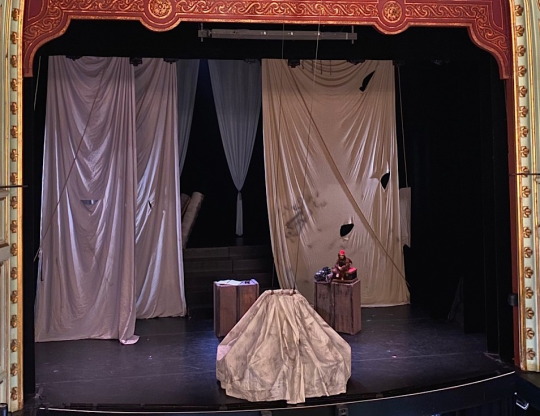
But then, cue: Overture... The chandelier sparked and exploded, started rising, and from here it became quite interesting. Old Raoul started stumbling around the sets, the drapes and columns which seemed to collaps around him, like a nightmare. Then with the drapes disappearing, the Hannibal set slowly came to view, and he was back in his youth, spotting Christine. This transition worked SO well, and felt quite unique.

TITLE SONG: Another scene that was fairly simple, yet underlining the magic and the danger in equal measures. The title song's first half featured a misty stage, and the Phantom and Christine partly crossing it. Then a large gate coming down, and a second Phantom and Christine couple appearing. The two couples mirrored eachother perfectly, as if one side was just a dream world, the world beyond.
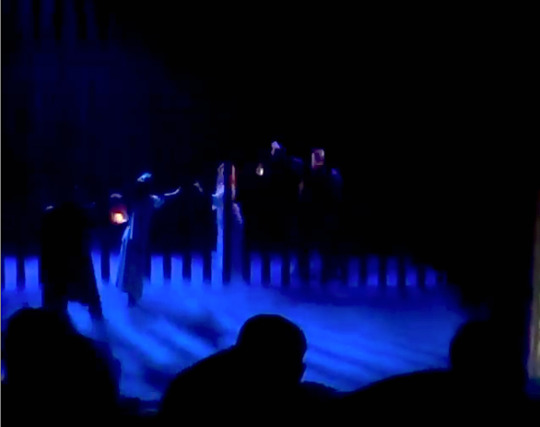
The couples disappeared, and so did the gate. With one couple re-appearing, a cage-like structure rose from the floor to illud the boat. The sets around them moved rather than the boat itself, and created yet another dreamlike illusion.

Now, if they'd had given the Phantom a proper boat pole instead of a garment hook pole the scene would have been perfect. But having worked in a clothes store and used these poles many a time I could not unsee it. Anyhow... The last part of the scene was the cage-boat lowered again, they entered the lair, with a gazillion floating candles, masks and an organ, and Christine sung the cadenza - pretty much how it's usually performed.
RED DEATH: OK, so this idea is as old as ALW's POTO itself. I first saw it mentioned by magic consultant Paul Daniels, working on the 1986 West End production. In his words:
“My best idea was not accepted by the director, whereby the Phantom would come down, singing Masquerade, and then the whole costume and his stick would twirl up into the air, and he would… not be in it, despite the fact that he’d been singing. But the director wanted him to be seen to go down to the underworld” (from the BBC documentary "Beind the Mask", 2004)
This idea was first experienced with in the Restaged Tour's Final Lair scene. There the Phantom disappears in a similar manner, cloak falling to the floor, the Phantom gone. But for the Kristianstad production they had Red Death doing it. He entered the top of the staircase through what looked like a giant cracked mirror, handing over the score, swirling out of the red hooded cloak and poof! Gone.
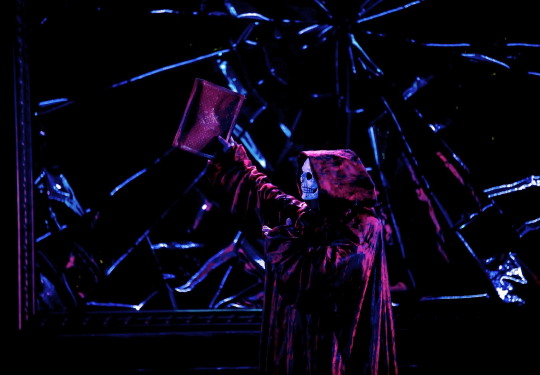
(it is also in this vein they feature Red Death in the Mediterranean production, currently performing in Madrid)
24 notes
·
View notes
Text
[BBC is UK State Media]
Adama blames France - which has had 1,500 troops in the region to fight Islamist militants - for the failure to contain the violence.
"They can't tell us that the French army was successful," she says. "I don't understand how they can say they're here to help people fight terrorism, and every year the situation gets worse."
Niger was seen as the last Western ally in the Sahel, this semi-arid region which has become the epicentre of jihadi violence. France and the US each station troops in Niger, which is also home to the US's biggest drone base.
But when France refused to recognise the new military government here, simmering resentment at perceived French interference in Niger's internal affairs boiled over.
Many Nigeriens believe France has had privileged access to the country's political elite and natural resources for too long. They see the coup as a chance for a clean slate, a way to get sovereignty back and be rid of French influence.
"The army has never stayed in power long in Niger," Adama says, referring to the five coups that have rocked the country since its independence from France in 1960.
"The military will eventually return to their bases and hand over to a better civilian government that will lead Niger to its destiny," she adds.[...]
Outside a military base in Niamey housing French troops, hundreds of protesters have been camped out for weeks, stopping supplies from reaching the personnel there.[...]
"In the whole of the Sahel, Niger is France's best partner." [...] "But it's France that is now refusing to accept what we want and that's why there's tension.
"France could have left quietly after the coup and came back to negotiate with the putschists. Why is Emmanuel Macron now saying he doesn't recognise our authorities, when he's accepted coups in other countries like in Gabon and in Chad?
"That's what has made us angry and we think France takes us for idiots."[...]
As we jostle for an interview with [the newly appointed governor of Niamey], he points to my producer and tells the crowd: "You see, people say we don't like white people, but we welcome them with open arms."
He tells me the people of Niger want a prosperous, proud and sovereign country and that outsiders should respect their will. When I ask if the junta can keep his country safe from terrorists, he replies that Nigerien forces have always protected their people, and can do so without foreign partners.
But those opposed to the regime fear the departure of French troops could be disastrous for Niger and the wider region.
"In the fight against the terrorists, France is a key partner that provides most of the intelligence that helps us beat the terrorists," Paris-based Idrissa Waziri, a former spokesperson for deposed President Mohamed Bazoum, tells me over Zoom.[...]
"France is not the problem, the problem today is this attempted coup which is a significant step backwards for Niger."[...]
"Unlike in Mali, the French army played a more supportive role in Niger, helping local troops in a more limited capacity" [Mr Koné, a different analyst] says. "The Nigerien army already had lots of experience fighting terror groups, especially on the eastern front against Boko Haram."[...]
Following a threat by the regional bloc Ecowas that it would invade Niger if deposed President Mohamed Bazoum wasn't reinstated, Mali, Burkina Faso and Niger set up an alliance on 16 September.
In the Sahel security alliance, they agreed to help each other against armed rebellions and external aggression. Mr Koné thinks this could be a game changer.
"The lack of cooperation between the three countries was one of the reasons terror groups could easily cross from one territory into the next," he says. "There's already been two or three joint military operations between these three countries. This increased cooperation is putting real pressure on the insurgents."
He also thinks the alliance could help share best practice from Niger to the other two countries.[...]
It's also hard [for us] to gauge how much support President Bazoum has in Niamey.
His closeness to the French government has angered many, but we struggled to get any of his supporters, or anyone opposed to the decision to expel France, to speak to us on the record. Most people seemed too scared of the consequences.
It didn't help that the junta followed the BBC team's every move in the country, and was aware of what interviewees told us.
26 Sep 23
#given how brits have covered mali & burkina faso its rly interesting how much more theyre covering niger positively#must be thinking abt how after france burns their bridges niameys gonna need someone to sell uranium to still#main resource difference i can think of
59 notes
·
View notes
Text
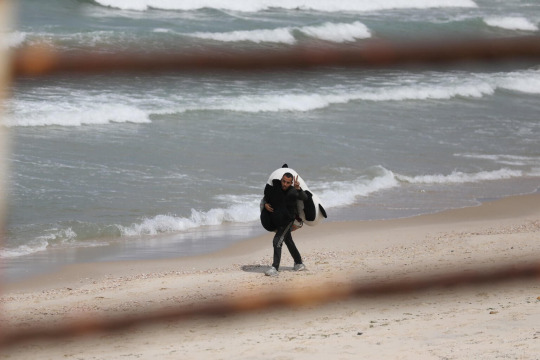
Establishment voices express fear of a rogue Israel
Two weeks after Israel attacked the Iranian embassy in Damascus, assassinating top Iranian commanders, Iran responded with drone strikes last night, and the world is asking, What will Israel do next?
The question is posed with anxiety. Israel has defied all western appeals to moderate its conduct in the last six months in Gaza, while the Iranian attack is seen as restrained and “performative” (per BBC and CNN coverage today). Indeed, the news behind the news this week is that Israel is approaching the status of rogue state even in establishment discourse.
A New York Times editorial called for the “pausing of the flow of weapons” to Israel – at long last – because Israel is destabilizing the region and the U.S. is “beholden” to an unaccountable leader, in Netanyahu.
The eroding international support for its military campaign has made Israel more insecure…. Mr. Netanyahu has turned his back on America and its entreaties, creating a crisis in U.S.-Israeli relations when Israel’s security, and the stability of the entire region, is at stake.
Jeremy Ben Ami of J Street also concedes that Israel’s onslaught in Gaza is “a serious setback for the interests and values of the United States.” A longtime Israel lobbyist, Ben-Ami says that Israel has surely committed “significant violations of international law”– thereby undermining Israel’s “legitimacy in the eyes of the rest of the world,” as well as “creating undoubtedly a new generation of terrorists, not just in the Palestinian population but throughout the region and around the world.”
(Time was when only the left was accused of delegitimizing Israel…)
H.A. Hellyer of the Carnegie Endowment for International Peace echoed Ben-Ami in an interview with NPR. Israel’s wanton destruction of Gaza has left the U.S. “incredibly isolated”. He described Israel as in essence a rogue state:
It’s escalation upon escalation. And I think that we in the international community, particularly in the United States, but also other allies, just need to recognize, you know, that’s the Israel we’re dealing with, and that’s the Israel we’re likely to keep on dealing with going forward.
Hellyer pointed out that Israel has “no interest in a two-state solution.” And the consequence is:
I’m afraid that it looks like a very destabilizing force in the immediate region.
Israel’s contempt for Palestinian rights is a theme echoed by the president of the Center for American Progress—the leading Democratic Party thinktank – who told Politico that Israel is not a democracy. Palestinians must have equal rights, and let’s drop the piety about two states, Patrick Gaspard continued.
We need to talk about whether the two state solution continues to be the sole pathway to peace
Palestinians — if we are going to solve this problem — need to exist in an Israel that is inclusive of their full rights.
Israel and its cheering section here deny that it’s possible for Jews and Palestinians to coexist. “I think that taking out the possibility of coexistence is, in itself, really cynical and tragic,” Gaspard said.
Even Nancy Pelosi is calling for the US to stop giving Israel bombs. While Elizabeth Warren at last called the Israeli actions “a genocide.”
And Rand Corporation security analyst Karen Sudkamp, who spent 10 years in U.S. intelligence agencies, says that Israel is heedlessly repeating mistakes made by the West in the “war on terror” in its contempt for the hearts and minds of Palestinians. It thereby undercuts security for all.
The New Yorker echoed Sudkamp in an article saying that Israel is embarked on a “forever war.” It has no strategy beyond heaping punishment on Palestinian civilians. And this undermines the United States.
Finally, this week we published an important investigation. Tareq Hajjaj reported on the massacre of hundreds of Palestinian civil/government employees at al-Shifa Hospital who were accused of being affiliated with Hamas and Palestinian Islamic Jihad. Hajjaj’s sources said these victims were not military operatives.
The army then brought out a huge number of men from the group of suspected Hamas and PIJ members and employees, gathering them in the center of the [hospital] courtyard. It then proceeded to execute them, one after the other.
The article has gotten wide pickup in media that are supportive of Palestinian human rights. The U.S. mainstream has so far ignored the massacre, typically– because Palestinians still don’t count for most editors. “The idea that Palestinians have a stronger claim to the ‘right to defend themselves’ never enters their minds,” as our commenter Donald Johnson wrote.
#israel#gaza strip#gazaunderattack#israel is a terrorist state#free gaza#genocide#gaza#jerusalem#free palestine#palestine#news#palestine news#news update#war news#news on gaza#palestinian doctors#war on gaza#rafah#rafah under attack#all eyes on rafah#free rafah#save rafah#west bank#tel aviv#yemen#free free palestine#egypt#lebanon#iran#iraq
21 notes
·
View notes
Note
I hope you had an excellent birthday!
I was wondering if you have a theory as to why Iain Banks’ novel, the Crow Road was both quoted “It was the day my grandmother exploded” and given a full, clear cover shot in S2. Maybe because the BBC once falsely claimed Iain Banks was a pseudonym for sir Terry? Or something else?
Hiya! Thank you. This is the description from the wiki:
From wiki: The novel describes Prentice McHoan’s preoccupation with death, sex, his relationship with his father, unrequited love, sibling rivalry, a missing uncle, cars, alcohol and other intoxicants, and God, against the background of the Scottish landscape.
The novel combines menace (it contains an account of a "perfect murder") and dark humour (note the opening sentence: “It was the day my grandmother exploded.”) with an interesting treatment of love. Banks uses multiple voices and points of view, jumping freely in both time and character. Even minor characters like Prentice’s grandmother, the fictional town of Gallanach, and his family’s home in Lochgair receive careful description, giving Prentice’s life depth and context.
The book follows Prentice’s journey of discovery about himself, those he loves, and the ways of the world.
“The Crow Road” is the name of a street in the west of Glasgow, but serves as well as a metaphor for death, as in “He’s away the Crow Road”. The appropriateness of this title becomes apparent as the novel progresses.
There could be themes from S2 in it... or maybe S3 also?
85 notes
·
View notes
Text
Macca being awkward whenever John Lennon is the topic
my highlight was really the hair twirling and the smiles on this one
42 notes
·
View notes